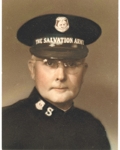One golden dawning, one glorious morning,
When earth’s dark shadows flee away,
Our voices blending in song unending,
In brightest realms of fadeless day.
There’ll be no sorrow in God’s tomorrow;
There’ll be no sadness, doubt, or fears;
There’ll be no sorrow in God’s tomorrow,
For He will wipe away all tears.
No sad repining; love’s sun is shining
Where Jesus dwells; O wondrous place!
Our praises voicing in glad rejoicing
To Him who saved us by His grace.
With Christ forever! No sin can sever
A fellowship as blest, so sweet;
We’ll sing in Glory salvation’s story;
Before His throne we’ll stand complete.
Perhaps you have sung these words at the funeral/memorial service of a dear friend or family member. What reassurance they bring! The melody is included in a selection written for Salvation Army brass bands: Peace of Heart by Leslie Condon.
What reassurance Share on X The songwriter, Sidney Cox, known as an American evangelist, is also famous for his prolific hymn-writing. Perhaps unknown to many, Sidney Cox was at one time a Salvation Army officer, first in Canada and then in the United States. Having been born in Northampton, England, in 1887, he emigrated to Canada in 1907 and took some business courses. He was converted to Christ in the Central Methodist Church in Calgary in 1908, and soon afterwards joined The Salvation Army there. His early song-writing was encouraged in Calgary by William Hawley, and his first published song was in The Musical Salvationist of June 1915. Unfortunately, we have no record of the title of that song! (Perhaps a reader of this blog can supply the information!)
The songwriter, Sidney Cox, known as an American evangelist, is also famous for his prolific hymn-writing. Perhaps unknown to many, Sidney Cox was at one time a Salvation Army officer, first in Canada and then in the United States. Having been born in Northampton, England, in 1887, he emigrated to Canada in 1907 and took some business courses. He was converted to Christ in the Central Methodist Church in Calgary in 1908, and soon afterwards joined The Salvation Army there. His early song-writing was encouraged in Calgary by William Hawley, and his first published song was in The Musical Salvationist of June 1915. Unfortunately, we have no record of the title of that song! (Perhaps a reader of this blog can supply the information!)
Cox entered the Training College in Toronto in 1909, and served as an officer for several years in Canada: at the Toronto Training College, in corps appointments, and at Divisional and Territorial Headquarters. He later moved to the United States, where he took the position of Education Director at Moody Bible Institute in Chicago. Then it was back to Salvation Army officership. Major Sidney Cox served in the USA Southern Territory as Education Secretary, Territorial Young People’s Secretary, Principal of the Training College and Territorial Revivalist.
In 1944 Sidney Cox became an independent evangelist, conducting campaigns throughout the USA and Canada, and also teaching in Bible colleges in Miami, Florida, and Atlanta, Georgia. In later years he recorded tapes for home Bible study groups, before his death in 1975. His keenness regarding the work of Jesus in our personal lives is evident in the lyrics of his many hymns, as is his desire to express his joy in God’s amazing love.
his desire to express his joy in God’s amazing love Share on XWORDS AND MUSIC: SIDNEY COX
S.A.SONG BOOK, 2015 EDITION, #543; 1987 EDITION, #888
REFERENCE: S.A. SONG BOOK WEBSITE: usawest.org





